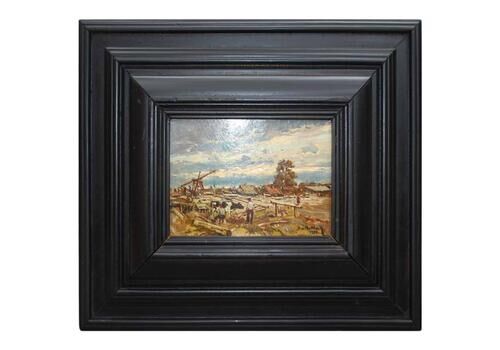17th Century Japanese Lacquer Cabinet On French Giltwood Regence Stand
£95,000 per item
Shopping at Vinterior
-
14-day return guarantee
-
Outstanding customer service
-
Secure payment
-
Buyer protection
-
Trees planted for every purchase

Item details
Height
157.0 cm
Width
94.0 cm
Depth
52.0 cm
Wear conditions
Good
Wear conditions
Excellent
Shows little to no signs of wear and tear.
Good
May show slight traces of use in keeping with age. Most vintage and antique items fit into this condition.
Average
Likely to show signs of some light scratching and ageing but still remains in a fair condition.
Apparent Wear and Tear
Visible signs of previous use including scratches, chips or stains.
Please refer to condition report, images or make a seller enquiry for additional information.
Description
An Extremely Fine and Very Important 17th Century Japanese Lacquer Cabinet on French Giltwood Stand of Regence Period circa 1680-1690
Provenance
Likely acquired by Herman Willem Daendels (1762-1818)
Mr. Herman August Daendels (1918-2000), Amsterdam
Eurasia Antiques, Amsterdam
Biënnale des Antiquairs, Paris, 1998
Private Collection, Belgium
Kollenburg Antiquairs, Oirschot-chosen for the press release for the Art Affair Fair, Amsterdam, in 2020, Also taken to TEFAF Maastricht
A Private European collection
This fine Japanese lacquer cabinet or ‘Cantoor’ was presumably originally acquired by a French connoisseur due to the French Regence period base it sit upon. The craze for lacquer in the west from the 16th century onwards has been extensively documented and it is generally accepted that the finest of all lacquers, technically speaking, were those produced in Japan rather than China. This cabinet is one of the best examples of Japanese export lacquer.
The lacquer work on the cabinet, executed in a variety of techniques including Maki-e, is exquisite and survives in amazing condition. The front depicts a landscape with mountains, temples, trees and a river with flying phoenixes, the lacquered boarders are more of a powdered effect. Each door has five gilt metal engraved brass hinges with further engraved gilt metal mounts to protect the corners of the doors and the outer carcase. There is a two part gilt metal lock plate to the centre of elaborate design that is particularly finely executed.
The sides being decorated with feature scenes of flowers and insects, with large and impressive engraved gilt brass handles. Like all of the finest lacquer, the decoration is executed in a variety of levels of relief, making the scene much more three dimensional as a result.
With Japanese export lacquer there was a evolutionary sequence to stylistic change that can be traced back with some accuracy during the 16th and 17th centuries. The Namban lacquer of the late 16th century relied on highly wrought mother of pearl inlay and gold lacquer on a black ground. As the 17th century unfolded, there was progression towards a generally finer lacquer without the use of mother of pearl coupled with this was an increased interest in a more pictorial style with landscapes being used more extensively initially within boarders. Gradually by 1690’s the borders began to disappear from export lacquer work, so the fact that borders are still in evidence on our piece is further proof of being earlier than 1690 in date for the lacquer work.
Most early Japanese lacquer arrived in the west through the Portuguese mercantile companies but this changed by around 1630 when most of the trade between Europe and Japan was conducted through the Dutch East India Company, as is almost certainly the case with the present piece.
The so-called "pictorial style" of Japanese lacquer work was developed around c.1630 specifically to suit the taste of the new Dutch market for such pieces and, as such, this became highly influential throughout the rest of Europe. Lacquer work required painstaking is built up of many layers of the prepared sap of thelacquer tree Rhus vernicifera. After applying each layer, the object is dried in a room with a high humidity and then sanded. The effects of relief are achieved by mixing lime through the lower layers of paint. For the decoration in gold, the maki-e technique is applied, whereby gold powder is strewn or gold foil is placed onto the wet varnish. The gold then sinks somewhat into the lacquer. After the lacquer layer has dried, it can be polished.. As such, pieces like the present cabinet would take a very long time to produce and this was also a factor in the high prices attached to goods of this sort in both the export and domestic Japanese markets.
The cabinet is supported on an exuberant giltwood stand French in origin and made in the RÈgence period in the early 18th century. The stand features four finely made cabriole legs, joined by a platform stretcher with a central vase of flowers and fruit in the manner of J. B. Monnoyer. The curving aprons to the front and both sides with the carved detail being extremely fine. The ground has been finely engraved with trellis work at points and there are raised areas with applied floral carving. The stand and the cabinet complement each other perfectly, creating an exceptional work of art that will appeal to any modern day connoisseur just as it would have fascinated those wealthy enough to afford such pieces in the early 18th century in France and the rest of Europe.
These early Japanese lacquer cabinets always have integral feet and were shipped to Europe without stands which were always manufactured for them when they arrived at their destination. Due to the Dutch control of the trade with Japan in the 17th century, purchases made by monarchs and leading connoisseurs throughout Europe would have been placed through agents in Amsterdam. Records survive relating to purchases of Japanese lacquer of this sort made by Louis XIII and Louis XIV and sent to Pairs via Amsterdam, the high cost of shipping via another European country added to the luxurious nature of these pieces and the exclusivity attached to ownership of them. It also became increasingly clear to European connoisseurs that Japanese lacquer products were superior to their Chinese equivalents and, as such, the trade in Japanese lacquer became a highly profitable business for the Dutch VOC (East India Company) and the various allied businesses.
Additional dimensions information:
Width: 37 inches - 94cm Height: 62 inches - 157cm Depth: 20 1/2 inches - 52cm
Cancellations
We offer free cancellations and full refund for orders cancelled before dispatching. View full policy.
Returns
We have a 14-day return guarantee for orders from individual sellers, within the UK and European Union. View full policy.
Estimated delivery time
One to two weeks
Free collection available
No
Similar Cabinets
Similar Cabinets
You may also like
You may also like
More from this seller
More from this seller
Choose a Wishlist
Create Wishlist
- Selling at Vinterior since 2019
- Ships from Benington, United Kingdom
Seller Reviews
Cancellations and Returns
Last updated: 24th March 2025
We want everybody’s Vinterior experience to be seamless, so both buyers and sellers can fall in love with pre-loved. We designed our Terms of sale to treat everybody fairly.
However, sometimes things don’t go exactly to plan, and you may need to cancel or return an order.
To prevent this, we encourage you to check listings, photos and descriptions carefully before you buy. If you aren’t sure about a piece’s condition, size, provenance or shipping, just ask; click Contact seller to get in touch. Always contact your seller first if you have any queries, at any point in your purchase.
Our buyers receive the same protection when buying from all our sellers, both professional and verified.
Can I cancel an order?
There are many reasons why you might need to cancel an order, and you'll often be entitled to a refund. To cancel an order, click Create cancellation on the order page.
If you cancel your order before it has been dispatched, you will receive a full refund - including delivery costs. However, if your item has been shipped, delivery costs will not be included in your refund.
Please note: orders of bespoke, personalised or made-to-order pieces cannot be cancelled.
Can I return an order?
We understand that sometimes a piece isn’t the perfect fit. So if you no longer want your order, our returns process will ensure it finds a new home fast.
The Vinterior Guarantee included with your purchase entitles you to 14-day returns - allowing you to return any item within 14 days of the delivery date (except in specific circumstances, detailed below).
You can return your order if...
It isn't what you expected
If what arrives isn’t what you ordered, you can open a return. Just send us some photo evidence that the listing was inaccurate, misleading or misrepresented your purchased piece, and you’ll receive a refund.
You change your mind
If you don’t feel a piece is right for your space, you can return it. Once you request a change of mind return, you’ll be responsible for shipping the piece back to your seller as soon as possible. Delivery costs are non-refundable.
It's damaged in transit
In the rare event that an item arrives damaged or defective, you have a full 30 days from the date of delivery to return it for a full refund.
If your purchase arrives broken, always let us know. If Proovia delivered the piece, we can raise an insurance claim on the seller’s behalf. Or, the seller can raise a claim with their chosen courier.
What can't I return?
Just as there are some orders you can’t cancel, there are some you cant return, too. Personalised, bespoke or made-to-order pieces are non-returnable, and non-refundable. Sellers may also reject your return if the item has been altered in any way.
Please note: pieces on our site are pre-loved, not new. They may show some wear and tear; this is not sufficient grounds for a refund, unless the seller has misrepresented the item’s condition.
Lastly, neither Vinterior nor our sellers are liable for any damages or loss sustained in transit via third parties.
I'm eligible for a return. Now what?
To initiate a return, log into your Vinterior account, then go to the relevant order page and click Create a return. In the return request, be sure to include all the details: the reason for your return, an in-depth description, and photos of any issues or damage.
How will I receive my refund?
Once the seller confirms they’ve received the item (in the same condition it was sent), we will send your refund to your original payment method.
All items are inspected on return. If the seller receives the return with damage they don’t recognise, we will not be able to process your refund and the seller may need to send the piece back to you. You will be required to cover these delivery costs.








